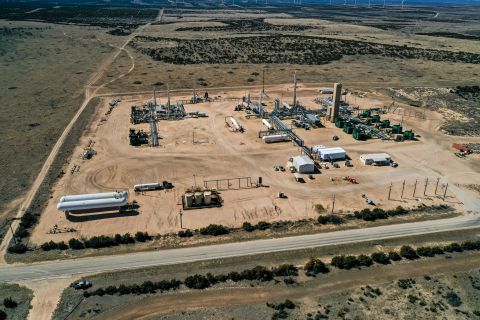A group of oil and gas companies has agreed on Sept. 10 to begin testing blockchain, a technology at the heart of digital currencies, in a bid to lower administrative costs in their field operations while also reducing payment disputes and chances for fraud.
The OOC Oil & Gas Blockchain Consortium, whose members include Chevron Corp., ConocoPhillips, Exxon Mobil Corp., Equinor and Royal Dutch Shell, among others, has awarded a contract to Data Gumbo to pilot the technology for water handling services in the Bakken shale field in North Dakota.
Blockchain, a technology that underpins bitcoin and other digital currencies, is a distributed ledger that can make and verify transactions on a network in real-time, offering the potential to cut costs and lower the risk of fraud.
In the pilot, Data Gumbo’s blockchain technology will be used to automate payments, which are typically handled manually and through third-party reporting that increases costs. The technology could generate about $3.7 billion annually in cost savings for the oil and gas water business, Data Gumbo CEO Andrew Bruce said.
“There is going to be a huge amount of cost taken out of the whole supply chain,” according to Bruce.
Data Gumbo’s platform, GumboNet, will synchronize data related to wastewater disposal.
Norwegian state-owned oil company Equinor, a member of the consortium, expects to save 25% in process costs related to saltwater disposal from the technology, according to Equinor’s Rebecca Hofmann, who is also chairman of Consortium.
The Oil & Gas Blockchain Consortium launched in February to develop ways the technology can be used in the oil and gas industry. The group hopes this pilot will pave the way for broader usage for blockchain in the industry.
Houston-based Data Gumbo has financial backing from Saudi Aramco Energy Ventures, the venture capital arm of state oil company Aramco, and Equinor Technology Ventures, a unit of Equinor. The company is already working with a large oil company to use blockchain to track drilling equipment and mud in the Gulf of Mexico.
Blockchain technology has already been deployed in energy trading. In 2017, Swiss trader Trafigura Ltd. teamed up with IBM and Natixis to develop a platform for U.S. crude oil deals.
Last week, Reuters reported a Sinochem subsidiary was in talks with Shell and Australian bank Macquarie Group to build an energy blockchain platform.
Recommended Reading
Midstream M&A Adjusts After E&Ps’ Rampant Permian Consolidation
2024-10-18 - Scott Brown, CEO of the Midland Basin’s Canes Midstream, said he believes the Permian Basin still has plenty of runway for growth and development.
No Rush: Post-M&A Frenzy, Divestiture Market to Pick Up by 2025
2024-10-07 - Lenders with a variety of capital structures are poised to fund the upcoming portfolio rationalization in the post-consolidation era, bankers and deal advisers said at Hart Energy’s Energy Capital Conference.
Marathon Oil Expects ‘Mass Layoff’ After ConocoPhillips Deal Closes
2024-10-31 - Marathon Oil’s merger with ConocoPhillips, which is to close by year-end, will trigger a layoff of more than 500 Houston employees, according to a state regulatory filing.
Exxon, Chevron Beat 3Q Estimates, Output Boosts Results
2024-11-01 - Oil giants Chevron and Exxon Mobil reported mixed results for the third quarter, with both companies surpassing Wall Street expectations despite facing different challenges.



